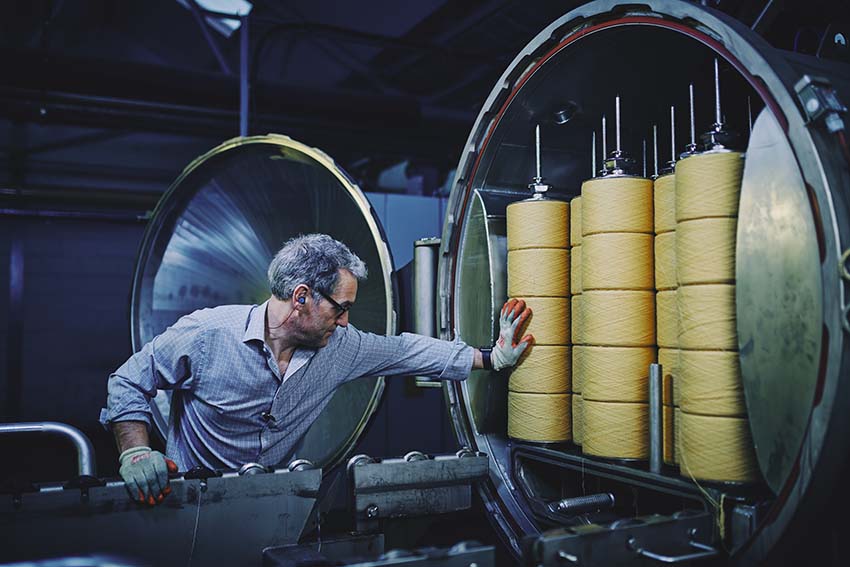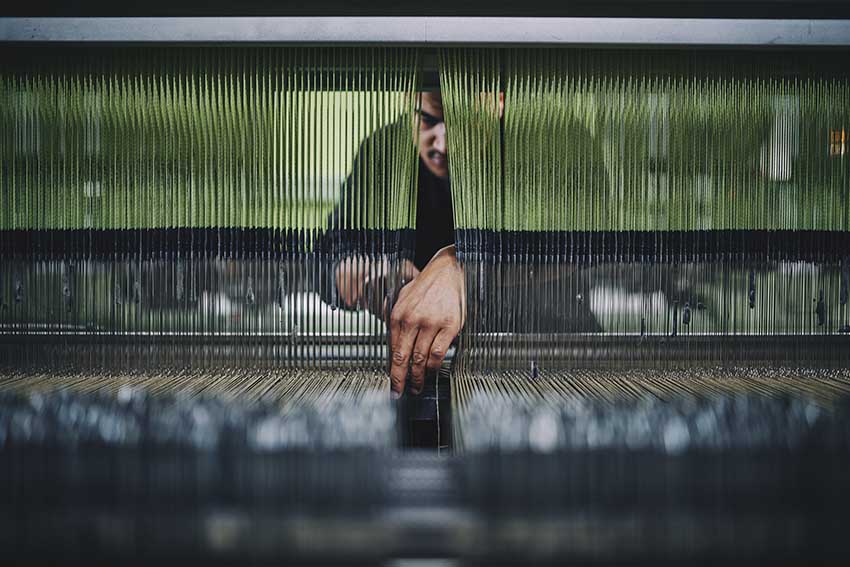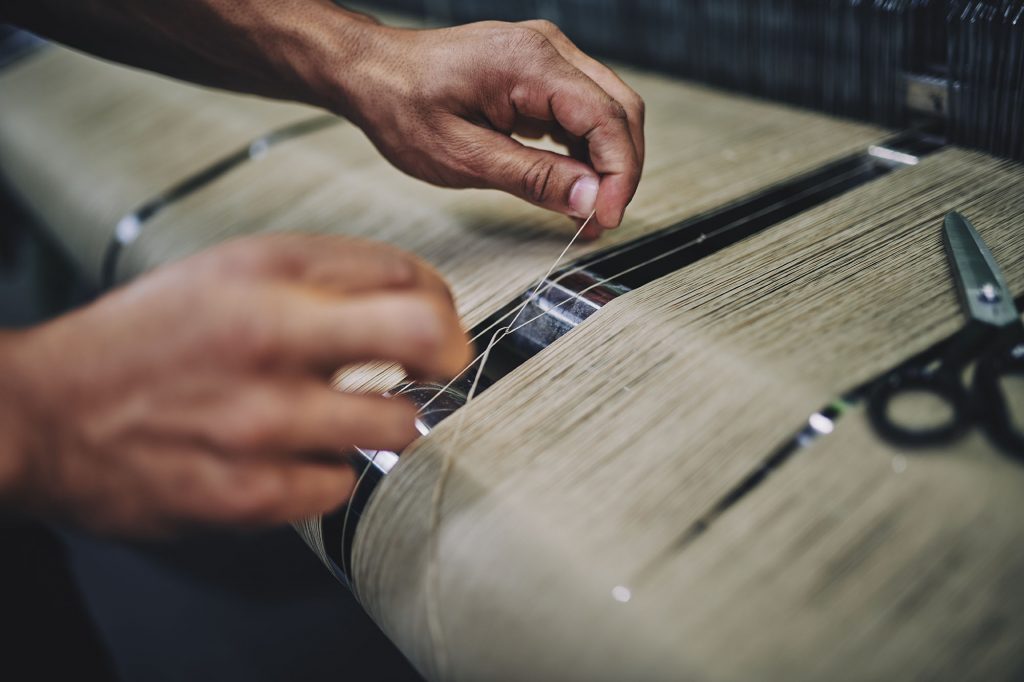Camira is a global designer and manufacturer of textiles for every space and sector; from commercial and residential, to public transport, including bus, coach and rail. The company is a privately-owned UK textile group founded in 1974 under the name Camborne Fabrics, but its heritage goes back to 1783 through various acquisitions. Until a management buy-out in 2006, the company was a subsidiary of Interface, an international manufacturer of textile modular floor coverings, for almost ten years. Today, Camira has an annual turnover of around £100 million and employs more than 750 people. Its products are sold in approximately 80 countries and the business produces roughly eight million metres per year.
Headquartered in the UK, Camira has manufacturing facilities in the UK and Lithuania, offices and showrooms in Europe, North America, Australia and China and a global network of agents and distributors.
The company has always been a pioneer of innovation when it comes to a sustainable understanding of textiles and has been producing recycled fabrics for more than 20 years, as well as innovating a new category of fabrics made from natural wool and bast fibres, such as nettle, hemp and flax.
Interview with Ian Burn, Director of Marketing & Sustainability at Camira
Easy Engineering: What are the main areas of activity of the company?
Ian Burn: Camira operates in two main markets: commercial interiors and passenger transport. The company’s fabrics are used in offices, hotels, universities, cinema, auditoria, shops, hospitals and in residential interiors. In public transport you can find Camira fabrics on buses, coaches, trains, and the underground. Camira is the manufacturer behind the iconic London Underground fabrics, the new Elizabeth Line fabric, and fabrics across the globe on office seats, indoor arena such as Leeds and Manchester, in universities, schools, colleges, retail spaces and hotels. Fabrics are used for upholstery on a wide range of seating, acoustic applications on walls and panels, headboards, divans and curtains in hotels, conference seating and in lecture theatres, as well as on scatter cushions and soft furnishings.

E.E: What’s the news about new products?
I.B: Camira has launched a groundbreaking new recycled wool fabric, Revolution.
The first fabric to be produced using Camira’s state-of-the-art textile reprocessing machinery, which the business acquired in 2022, Revolution is a closed loop textile, created using waste wool yarn from Camira’s own manufacturing processes.
Each shade in the Revolution colour palette has been developed with the original colouration of the recycled woollen fibres as its base. This innovative method of colour curation eliminates the concept of dyeing, reducing the use of chemical dye stuffs. Revolution extends the lifespan of wool and enables this precious natural resource to be used all over again as fabric on furniture.
Marking a new era in wool textile circularity, Revolution sees waste wool yarn stripped back into its fibre form and then blended with virgin wool, before being carded, spun, and woven into fabric. With an irregular twill weave, the unique fabric has an appealing surface detail and soft touch finish and performs to the highest commercial standards.
Developed at Camira’s manufacturing sites in Huddersfield, Yorkshire the creation of Revolution is inspired by a local, traditional technique of wool recycling known as ‘shoddy’ manufacturing, first established in Yorkshire in the 1800s.
E.E: What are the ranges of products?
I.B: Camira designs and manufactures beautifully woven, environmentally sensitive fabrics for the commercial, residential and transport sectors, delivering style, without comprising performance. The Camira product portfolio includes a range of wools, polyesters, recycled polyesters, bast fibres and closed loop yarns.
Best-selling fabrics include wool and harvested flax textile, Main Line Flax, classic pure new wool upholstery fabric, Blazer and created entirely from post-consumer recycled SEAQUAL plastic removed from the sea, Oceanic and many more.

E.E: At what stage is the market where you are currently active?
I.B: There are interesting market dynamics in the post-Covid world, in particular in the commercial office segment, where hybrid working between home and office is now the norm. This means that the office is becoming a destination in its own right and must therefore “earn the commute”. So it must be inspiring for collaborative working, whilst also affording personal privacy for focus and concentration. There is still great emphasis on adaptive, flexible workspaces and furniture, acoustic applications for noise control, and increased use of curtains and drapery for space division as well as light shading. The boundaries between different market segments are no longer distinct, so there is a blurring between office, hospitality, education and residential, giving rise to the so-called resimmercial trend.
In transport, all segments – train, bus and coach – are enjoying greater numbers of passengers, be it for work or leisure. Coach travel was affected most of all by the pandemic, but this is also improving as travel and tourism resumed and demand for overland motorcoach trips increased. Transport seating is often upholstered using complementary combinations of wool and vinyl, with vinyl used for headrests, side panels or combination seat pads.
E.E: What can you tell us about market trends?
I.B: Sustainability is high on the agenda within the textiles industry at present, with conversations between manufacturers, specifiers and end-users ongoing. Camira predicts further discussions between furniture companies and textile manufacturers which will centre around whether upholstery waste can be returned and re-purposed, or recycled into furniture.
The ultimate benefits of achieving sustainability are enormous, as the textile sector globally has had a poor reputation in the past in areas such as greenhouse gas emissions, excessive production and waste, water usage and pollution. Accelerating to a more sustainable industry can benefit us all in many different areas, be it more sustainable manufacturing practices, improved supply chain practices, more sustainable material choices, reduced waste and more recycling.
E.E: What are the most innovative products marketed?
I.B: Camira’s technical knitting capability, Camira Knit is an entirely waste free manufacturing system. Using computer aided design (CAD), Camira Knit fabric is custom made for an individual product, ensuring it fits the specified dimensions exactly, and delivers zero-waste textile components which can be applied to furniture with exceptional ease. In addition, knitted fabrics are generally designed for dis-assembly, so can be effortlessly removed from furniture, and easily recycled as they are made from mono-materials.

Additionally, Camira has developed a method of mixing bast fibres with wool to create commercial fabrics that perform to a higher flammability standard. Bast fibres have been around hundreds of years, with bast fibre plants producing textile fibre in the stems of nettles, hemp, flax and jute. However, Camira discovered that mixing nature’s own collection of rapidly renewable bast fibres with pure new wool, provided further enhanced performance and aesthetics and created sustainable fabrics which are inherently flame retardant. They are also biodegradable and contribute to the biodiversity of the fields in which they are grown. Some of our bast fibre fabrics are Main Line Flax, and Hemp.
E.E: What estimations do you have for 2023?
I.B: Camira is working hard to continue to innovate in both product developments and manufacturing processes. A key area of focus is textile circularity, using new recycling technology which enables Camira to recycle wool yarn, wool selvedges and wool fabric waste. Camira’s aim is to set the standard for textile design, manufacturing and sustainability and by doing so become the natural choice for fabric and textile solutions globally.
There has also been a recent acceleration of artificial intelligence (AI) within the textiles industry, to help with visual inspection jobs such as color matching, pattern making and the sorting of fibres. Camira is now exploring new ways of using A to assist with quality control and efficiencies.

